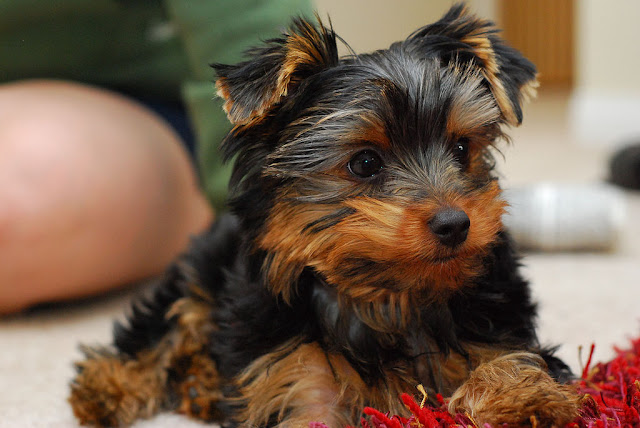 |
| (Source: Flickr) |
The key to successful potty training is ROUTINE and CONSISTENCY! Create a routine for your pup and be as consistent as possible with it. Once your puppy is completely house trained, you will not need to be so vigilant. Please understand that puppies between the ages of birth and 16 weeks will not be able to go all day or all night without potty breaks. Some start holding all night earlier, but this is a good guide. It can take a full year for your pup to be fully housebroken and be trusted out of the crate unsupervised. If you do not take your puppy out, they will go in their crate. You DO NOT want this. Dogs instinctually avoid defecating where they sleep. If your puppy does potty in his crate, it is not his fault, you should have taken him out. There are some cases of puppies with health issues that go in their crates no matter what you do.
 |
| (Source) |
There are times you can be guaranteed your puppy will need to go out. There are immediately after waking from a nap or a nights sleep, after eating, and after a play session. You will see the puppy begin sniffing the floor and pointedly looking for something. Use these times as a guide to set your pup up for success. I always have some treats by the door where I take my puppy out. EVERY TIME your puppy potties outside, give a treat and tell him/her what an awesome and smart pup he is.
 |
| (Source) |
Feeding and Potty Training
Feeding correctly also helps. We feed a premium quality all life stages food. A premium food will ensure your pup is using all of the nutrients possible, which means less poop and potty breaks.
 |
| (Source) |
It is recommended that you feed your puppy 3 times a day until they are through their major growing stage. Leaving the food down all the time doesn't allow for a schedule for feeding or potty training. You should offer your puppy as much food as he can eat in 20 minutes and take it away. (I usually offer 1.5 cups for most small to medium breeds.) The guide given on the bag is a good starting place of how much to feed. After the puppy is finished eating, CARRY them outside immediately and wait.
 |
| (Source) |
Night Time
On the first night at home, I get my puppy set up in a crate with a nice soft washable bed or blanket next to my bed. I like a sherpa crate mat or a microfiber bath mat. These are very washable and do a good job of covering the entire crate floor so you don't wake up at every move your puppy makes. I like the crate right next to me so I can hang my arm down and help comfort the puppy. This helps everyone get better sleep for the first couple of nights.
 |
| (Source) |
Your nights will be as follows:
- Puppy settles (finally).
- Puppy wakes after a few hours.
- Take puppy out while keeping the house as dark and quiet as possible. After the puppy potties, give a treat and a quiet, calm snuggle.
- Puppy goes back in the crate and you go back to bed.
- Repeat.
Most puppies will need to go out at least twice in an 8 to 12 hour period, some will need more. The frequency should lessen quickly as your puppy grows By 12 to 16 weeks, your puppy should be holding it through the night on most nights
Accidents Happen
Accidents are going to happen to us all. You misread the signs, you didn't make it home in time, or you just couldn't get to the puppy in time to get him out the door. Don't sweat it. Don't rub the puppy's nose in it. Put the puppy in her crate and clean it up. If you are giving good positive feedback when the puppy goes where you want her to, she will get the idea! Just keep in mind that it takes children 2 to 4 years. You will not have to work at this that long.
Why Didn't You Go?
On those occasions your puppy doesn't go when you take him out, put him right back in the crate. Your puppy gets no free time in the house until he potties outside. You are trying to set him up for success. If you take your puppy out and he doesn't go, and you bring him inside and let him run around the house...HE IS GOING TO POTTY IN YOUR HOUSE. Just put him back in his crate, wait 5 minutes, and take him out again. Repeat the process until he finally potties outside. Then have a big play session inside.
We hope this helps you get your pup potty trained as quickly as possible. Please feel free to contact us with questions at (678) 986-4083 and check out our website.
-Mecca and Joan


What's the biggest challenge you've come across when it comes to potty training your dog?
Let us know in the comments!


![Disclaimer [Disclaimer: The information in this post is not intended to replace the advice of your own veterinarian. This post also contains affiliate links.]](https://blogger.googleusercontent.com/img/b/R29vZ2xl/AVvXsEjSBbqXQ71hJg3tHLeEhkRl1H36tgJZ-2NZXmAljBxWi9raGaKIO4jFYjgo-nVjCSjYA0LY3PhPvF2uPpbMfqh5Ylmr-PMzsPAfERSaLi87EDq0Fv9vUinemxS-iounB2a7aitROLRXj_3F/s640/vetdisclaimer.jpg)



hi
ReplyDelete